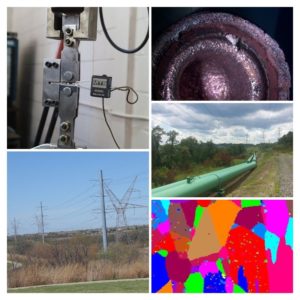Corrosion Investigation is the process of collecting and analyzing data to determine the cause of a corrosion failure, often with the goal of determining corrective actions or liability. It is an important discipline in many branches of manufacturing industries where it is a vital tool used in corrosion control.
The corrosion failure analysis process relies on collecting failed corroded components for subsequent examination of the cause or causes of failure using a wide array of methods. Methods of corrosion investigations include electrochemical techniques per ASTM and NACE, microscopy and spectroscopy. The NDT and non-destructive testing methods are valuable because the failed products are unaffected by analysis, so inspection sometimes starts by using these methods.
Furthermore, we undertake failure analysis with networks of PE’s and NACE Certified Corrosion/Materials Selection/Design qualified metallurgists, chemical engineers, technologists and scientists who are some of the most experienced in their field. Using an extensive range of proven techniques and applications, we provide analysis of and insight for solving your asset failures.
With our technique of corrosion investigation, it begins from pipeline failure assessment to commercial building corrosion risk analysis, evidence analysis to material characterization, and forensic engineering and litigation support.

Analysis of a corroded part can be done using electrochemical techniques. Destructive testing involves removing a corroded component from service and sectioning the component for analysis. Destructive testing gives our failure analyst the ability to conduct the analysis in the lab and perform corrosion and metallurgical tests on the material that will ultimately destroy the component.
Non-destructive testing is a test method that allows certain physical properties of metal to be examined without taking the samples completely out of service. NDT is generally used to detect failures in components before the component fails catastrophically. Our metallurgical inspection provides information on metallurgical phase characteristics and heat treatment.
Corrosion Assessment of Steel Reinforcement in Concrete
Our capabilities include:
- Analysis of Corrosion Failures
- On-site Investigations
- Corrosion of Welding, Soldering & Brazing Analysis
- Corrosion Testing (ASTM and NACE)
- Corrosion Analysis and Investigations
- Stress Corrosion Cracking and Corrosion Fatigue
- Corrosion Engineering Calculations
- Atmospheric Testing
- Pipeline Corrosion Investigation
- Plastic & Rubber Investigation
- Micro and macro-photography
- Surface Analysis(XPS, AES, and SIMS) and FTIR
- Fractography (SEM and TEM): Corrosion Mode Determination
- Corrosion Mitigation and Cathodic Protection
- Corrosion Testing electrochemical and exposure tests
- Root-Cause Failure Determination
We undertake corrosion failure analysis with networks of qualified NACE Certified Corrosion Engineers, Chemical Engineers, Technologists and Scientists who are some of the most experienced in their field. Using an extensive range of proven techniques and applications, we provide analysis of and insight for solving your asset failures, from pipeline failure assessment to commercial building corrosion risk analysis; evidence analysis to material characterization; and finally forensic engineering and litigation support.
Corrosion Assessment, Corrosion Mitigation, and Corrosion Testing
Corrosion assessment defines corrosion risks. Corrosion assessment and corrosion tests are usually divided into two main categories: laboratory tests and field tests, each of which has its advantages. For example, the environmental conditions present in real-world applications are different from those in laboratory situations. Therefore, it is difficult to extrapolate the results of laboratory tests to industry settings in most cases. On the other hand, in laboratory tests, it is possible to accelerate the corrosivity of the environment to obtain results more rapidly and determine life expectancy when corrosion performance parameters and corrosion mechanisms are known.
